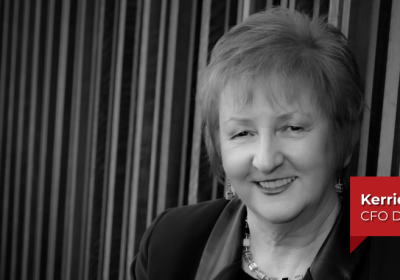
- Author: Nicole Madigan
- Posted: March 28, 2022
Keeping Score > Richard Gardham, CFO NRL
It was a case of baptism by fire for NRL CFO Richard Gardham, who stepped into the role smack bang in the middle of the COVID-19 Pandemic.
The suspension of the 2020 season saw the NRL undergo a major restructure, leading to Gardham’s appointment as CFO.
He was no stranger to the NRL though, having held numerous roles within the organisation since 2014, both within the Clubs and States Services Team, and eventually as the Salary Cap Auditor, a role that still falls under his remit.
“Given I stepped into the role at the point the 2020 season was suspended it has been a case of learning on the job and collaboratively working across all areas of the business to achieve our goals,” Gardham says.
“I also have responsibility for finance, procurement, IT and facilities while maintaining overall responsibility for the salary cap.
“It’s a broad role given the stakeholder environment, media interest and changes the game has gone through as a result of the impact of the pandemic.”
A lot has changed in the short time since Gardham took over the role, given the constantly changing economic and social environment caused by the pandemic.
“2020 was about survival and minimising losses, while 2021 has been about renovating the industry, such as the NRL restructure and revised distribution agreements, and setting up the organisation for future growth,” he says.
More than money
For Gardham, the challenges of working in sport were appealing, because they were about more than money.
“The focus on financial performance is balanced with the game’s other responsibilities such as driving social change and connecting communities.
“Balancing the requirements across all levels of the game – what is the right amount to invest in the elite compared to the grassroots, pathways and community programs?
“I don’t know all the answers, but I can be a facilitator to develop the answer. Everyone has a viewpoint worth listening to, they won’t all be the same, so any decision needs to be justifiable.
“I treat the game’s money as if it were my own – so I constructively challenge to look for opportunities to do things differently.”
Richard Garham, CFO | NRL
COVID-19 and sports
Like many industries, COVID has challenged the sports industry to think differently. But Gardham says with every challenge, comes opportunity, and the NRL has viewed the pandemic as an opportunity to reset and establish a base for future growth.
“Given the importance of broadcast, sports don’t have the luxury of being fully remote and therefore the NRL has had to think differently and put in place actions to mitigate risk,” he says.
“We have demonstrated where clubs, states, players and head office work together we can achieve and lead all sports. We’ve also asked our staff to take on new roles and show a greater level of flexibility due to the need to react quickly to changing circumstances.”
Since becoming CFO, the financial challenges faced by Gardham have revolved almost entirely around COVID.
Issues such as the temporary suspension of the 2020 season, and the renegotiation of major contracts were key, along with managing cash throughout the period to ensure stakeholders were adequately funded.
“(There was also the) large scale restructure of the business, and renegotiated funding agreements with the Players, Clubs and States, to allow for a more sustainable long term model going forward.”
Not to mention, the relocation of the 2021 NRL Competition to Queensland.
But it hasn’t been all doom and gloom, with Gardham experiencing some personal career highlights in the short time he’s held the role of CFO, despite the pandemic.
“Such as implementing the Commission’s strategy, which will see our game post a surplus for the last financial year, despite the challenges of COVID.
“I really enjoy being part of a small team which ensured the NRL was the first major Australian sport, and one of the first globally, to return to the field in 2020, resulting in colleagues being able to return to work and no longer furloughed.
“I enjoyed working around the clock to ensure the relocation of 13 NRL teams to Queensland so the 2021 season could be safely delivered. It was also a privilege to be part of the selection panel for the NRL 17th Team which supports further expansion of the game.”
COVID-19 presents future opportunities too, Gardham says.
“NRL has led many sports in mitigating the risks and as we continue to do this it shows we are a strong sport who will continue to grow.
“Growth in our non-contact products (touch and tag) will continue to bring new players and fans to the game. With expansion taking place in 2023 with the introduction of the new team, the second for Brisbane) it provides opportunities to speak to a new fan base.
“Growth in the international game with the World Cup scheduled to be played in England in October and November 2022 is also important.”
The future looks bright
Having finalised broadcast agreements with major partners until 2027, and restoring the balance sheet damage caused by the disruption to the 2020 season, Gardham says the NRL’s future looks strong.
“With the start of a new broadcast cycle in 2023 part of my role this year, I will be putting in place distribution agreements with the Players, Clubs and States and working with the Board to establish the strategy for the next five years and beyond.”
There will be some challenges though with COVID-19 expected to continue to disrupt sport.
“We have put in place systems and processes to mitigate where possible. We’ll need to continue to be agile and adaptable to meet the ever-changing external environment.
“It’s also important to get the balance right between the elite sport and the continued development of our grassroot and community programs so we are not only delivering a world class entertainment product now but developing the players and fans of tomorrow as well as using sport to make a difference in people’s lives through our award-winning community programs.”
CFO Magazine A/NZ asked Gardham his views on three of the biggest issues impacting sport – digital, diversity and ESG (environmental, social, governance). Here’s what he had to say.
E-sports
“Digital is an opportunity – with changes in consumer behaviour and the way content is digested, it provides a new form of media to speak to our customers and promote our partners,” Gardham says.
“We need to work closely with our media and corporate partners to make sure we are taking up opportunities and creating engaging content as well as complementing their products.
Diversity
“Diversity is critical – a large number of our player group (both elite and grassroots) is drawn from indigenous, Torres strait island, Māori and Pacifica heritage,” he says.
“We also have a focus on making the game as inclusive as possible with many formats – tackle, touch, tag – and options for men’s, women’s and mixed.
Gardham says the stance the game took with the introduction of the no fault stand down as well as the NRL’s Voice against Violence program and school to work program are examples of how the NRL wants to use Rugby League as a vehicle to make positive differences in people’s lives
“From my perspective diversity across teams in both gender and background is key – I’ve worked hard in my team to have a reasonable split of male to females as well as people who come from different cultural, education and working backgrounds.”
ESG
“During my time working at the NRL, we have always had a view on the social impact the game can have directly through our community programs, and indirectly through the voice of the players and high profile administrators,” says Gardham.
“We also heavily assess any partnerships we enter as we have a keen awareness of our social responsibilities.
“Given the impact of COVID-19 on the game the focus has been on competition continuity the last two years.
“As we emerge from the pandemic though, discussions regarding ESG and how it relates to the NRL are beginning to form the focus of our thinking.
“Governance has also been critical, and we continue to evolve our governance and controls through both external and internal audits and regular reviews. Environmentally we are taking steps to develop an NRL Sustainability Agenda to establish how we take this forward.”








